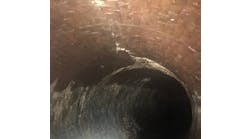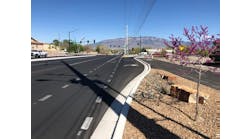In the late 1990s, one western Pennsylvania sewage treatment plant (STP) sought to process Class B biosolids on-site, eliminating the expense of hauling liquid off-site and significantly decreasing associated labor costs. At the same time, the plant needed to achieve higher cake solids and provide strict odor control. In addition, the selected equipment also had to be able to greatly enhance process efficiencies at not just the one plant, but its sister facility as well. Fortunately, USFilter offered a fairly simple solution to meet the STP's seemingly complex needs.
The borough of West Mifflin, Penn., is a community located about nine miles southeast of downtown Pittsburgh. For years, the West Mifflin Sanitary Sewer Municipal Authority (WMSSMA) hauled liquid from its New England STP (a 1.2 mgd plant) to the Thompson Run facility (a 4.5 mgd plant), where it was processed on a belt press for dewatering. However, the hauling and associated labor proved very costly, and it was not always easy to coordinate dewatering schedules for both plants.
Additionally in the late 1990s, the WMSSMA faced a requirement to achieve higher cake solids and provide odor control that would respect nearby homes and businesses. Moreover, space constraints and staffing reductions necessitated a simple-to-operate installation.
Liquid Clarifying and Solids Dewatering: A Continuous Process
A team which included members of the WMSSMA and West Mifflin's engineering firm, Chester Engineers of Corapolis, Penn., decided a liquid clarifying and solids dewatering system would address all of the borough's biosolids needs.
The team decided to use three USFilter technologies in combination at West Mifflin's New England STP: a Stranco Products Polyblend® M Series polymer feed system, a USFilter J-Spin® centrifuge, and a screw conveyor from Asdor Products. This would mark the first J-Spin centrifuge installation in North America.
This technological configuration involves first feeding polymer inline to the J-Spin solid bowl decanter centrifuge via the polymer feed system. The feed slurry passes into the feed distribution chamber of the centrifuge, where it quickly accelerates to the speed of the bowl. G-forces drive the solids to the bowl wall, while the clarified liquid flows to the adjustable overflow weir.
The internal conveyor turns at a slightly higher speed than the bowl, carrying the solids to the end of the conical section where they are discharged from the centrifuge. The slower the conveyor moves in relation to the bowl and the longer the sediment remains in the centrifuge, the greater the liquid/solid separation efficiency. The differential speed between the bowl and conveyor is controlled automatically, providing the maximum liquid/solids separation efficiency and highest cake solids.
At the New England STP, the centrifuge discharges into a 22-in. diameter Asdor screw conveyor, which carries the solids to a roll-off bin that is hauled to local landfills once a week. Currently the liquid, or centrate, is passed back through the system for additional processing, although eventually the STP would like to release it into a nearby tributary.
Less Odor, Less Maintenance, Less Expense
Fully operational since July of 2001, the enclosed J-Spin design has helped to reduce odor emissions, attests the WMSSMA's general manager, Ken Frick. Moreover, it is easy to clean and does not allow hydrogen sulfide to waft throughout the building. And with its small footprint and few external moving parts, the J-Spin centrifuge takes up minimal floor space and is safe to operate.The 50-gallon-per-minute (gpm) centrifuge enables the New England STP to achieve a cake solid of 22 percent to 24 percent, which is greater than what its Thompson Run counterpart is producing with its belt filter press. Now much easier to handle, this denser cake also saves the facility approximately $5,000 per month, as it is hauled from the facility directly to the landfill.
"We pay by the ton when hauling biosolids," explains Wyatt Sainato, assistant operations manager of the WMSSMA. "The biosolids that are hauled from the New England STP to the landfill are higher in solids, so we can pack more into a truck. As a result, we have really reduced our hauling cost."
The unit itself is saving the plant more money, with a sole operator spending only an average of 15 minutes each on startup and shutdown. In addition, the centrifuge is low maintenance, requiring minimal hands-on upkeep.
"The integrated system from USFilter has allowed both facilities to streamline their biosolids processing," reflects Frick. "We've been able to process more sludge in less time and for lower hauling costs. And these are just some of the short-term benefits. The long-term ones will come in time."


